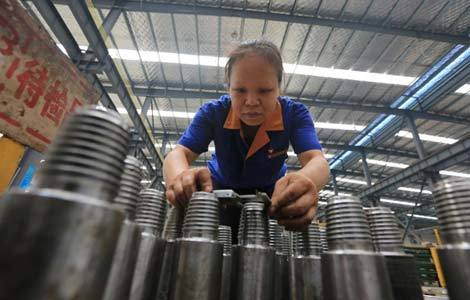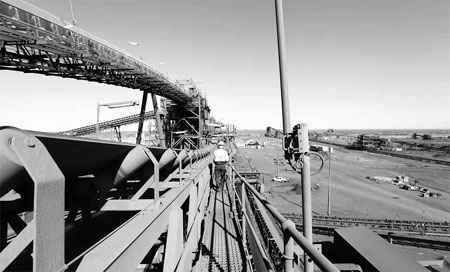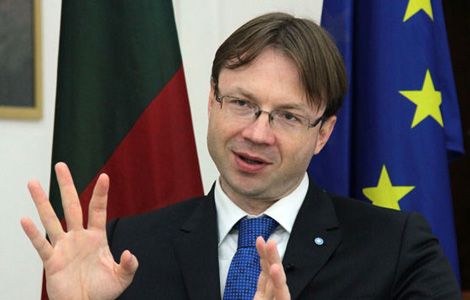China's urbanization, growth will buoy demand for Australian miners
Updated: 2013-07-16 07:13
By Du Juan in Perth, Australia (China Daily)
|
||||||||
|
A manager inspects ore processing equipment near a mine of FMG, the world's fourth largest iron ore miner. Despite an economic slowdown, China's advancing urbanization and the growth will continue to create demand for Australian iron ore. Du Juan / China Daily |
China's ongoing urbanization drive and continuous economic growth will keep bringing stable demand for Australian iron ore, said a top official at Fortescue Metals Group Ltd, the country's third-biggest iron ore producer.
"Although China's economic growth is slowing down, the 7 percent growth rate is still very strong," said Neville Power, chief executive officer of FMG, which is also the world's fourth-largest iron ore miner.
Power added that he believes that Chinese demand for iron ore will continue to increase.
Regarding the company's debt load, he also expressed confidence in the future.
"We're not having any pressure on financing," he said. "Our balance sheet is very strong and we have no time pressure on repaying the debt."
During the last Australian fiscal year - from July 1, 2012 to June 30, 2013 - FMG's fixed-asset investment reached $6.3 billion, the highest level since the company's establishment in 2003.
The company's debt is now at $12 billion, with $2 billion of cash in hand. However, FMG doesn't have any debt to repay before November 2015, according to the company.
Meanwhile, the company's production capacity is growing rapidly and the contracts with Chinese steel companies are steady, which can generate cash, industry observers said.
"Costs can be an issue for a company like FMG, which is highly leveraged, but their production volume is going up, which means that if prices decline they can still be profitable," said Sebastian Lewis, editorial director of Platts China, a commodities information provider.
In the last few months, international iron ore prices have been falling, and most analysts and industry players believe that they will continue to drop until they reach a reasonable level.
According to price forecasts for iron ore with 62 percent iron content by UBS, CLSA and RBC, prices will keep falling in the long term. CLSA estimates that prices will drop to around $90 a ton in 2014.
Lewis said that at the current level, which is about $120 a ton, most mining companies are making money.
Andrew Forrest, FMG's founder, said that a drop in iron ore prices will not affect the company.
He said the company will continue to focus on China and the iron business for the foreseeable future, but it's possible that the company will also invest in other commodities which China has demand for.
Up to 95 percent of FMG's iron ore is shipped to China.
Founded in 2003, the company spent five years on exploration, design and infrastructure construction before it shipped the first iron ore load to China's Baosteel Group in May 2008.
So far, the company has supplied more than 240 million tons of iron ore to China.
In the 2013 fiscal year, the company's iron ore output was 80 million tons, and the figure is expected to grow to 127 million to 133 million tons in the 2014 fiscal year. By the end of this year, the company will have a total production capacity of 155 million tons. It doesn't have any immediate major capacity expansion plans after that, according to Power.
Experts said FMG was lucky enough to grasp the "golden age" of China's steel industry in the past 10 decade. The country's steel output increased from 200 million tons in 2003 to 700 million tons in 2012.
At the same time, China's dependency on foreign iron ore supplies increased from 40 percent to about 70 percent currently.
Due to China's growing demand and rising costs, imported iron ore prices soared from $30 a ton in 2003 to the record level of about $200 a ton in 2008.
And although the company has a super-high dependency on the Chinese market, Power said that this is not risky.
"FMG's shipping cost to China is lower than Vale SA, the Brazilian mining giant, and we'll continue to reduce it," he said. "We're making efforts to help our most important client - Chinese steel mills - to be profitable and sustainable."
The company is also looking for opportunities to explore other markets, such as Europe, Japan and South Korea, according to Power.
The Pilbara region in Western Australia, where FMG's iron ore tenements are located, is the most competitive source of seaborne iron ore supplies to Northeast Asian economies and increasingly to emerging economies in Southeast Asia, South Asia, the Middle East and North Africa, according to Power.
(China Daily USA 07/16/2013 page14)

 Obama urges restraint amid protests
Obama urges restraint amid protests
 Putin wants Snowden to go, but asylum not ruled out
Putin wants Snowden to go, but asylum not ruled out
 Apple to probe death of Chinese using charging iPhone
Apple to probe death of Chinese using charging iPhone
 Investment falters as industrial activity flags
Investment falters as industrial activity flags
 Rape victim's mother wins appeal
Rape victim's mother wins appeal
 Reproduction of 'Sunflowers' displayed in HK
Reproduction of 'Sunflowers' displayed in HK
 Land Rover enthusiasts tour the world
Land Rover enthusiasts tour the world
 US star sprinter fails drug test
US star sprinter fails drug test
Most Viewed
Editor's Picks

|

|

|

|

|

|
Today's Top News
Spain apologizes to Bolivia for plane delay
International cotton contract in the works
Smithfield shareholder still presses for break up
China calls for new talks on Iran nuclear issue
Global warming may largely raises sea level
Putin wants Snowden to go, asylum not ruled out
US: China can balance own growth
Top foreign study destinations for Chinese
US Weekly

|

|







